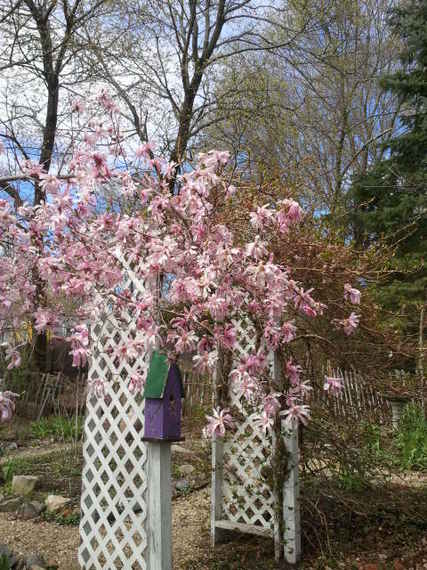Even the doctor was shocked when she saw me last week. "You poor thing!" she said, shaking her head.
That's not what you want your doctor to say to you under any circumstances, but she had a good reason: I came into her office looking like the Elephant Man's ugly little sister. One side of my face was swollen beyond recognition, and my eyes were crusted shut.
Thank you, poison ivy.
I brought this condition on myself. You see, I've been revising this garden one weed and seed at a time. My husband and I bought a 1700s house from an elderly couple. The couple once had a beautiful garden, but they hadn't done much in the yard for about ten years before we bought the place. I didn't even know there was a garden out back until, one morning, I suddenly noticed a tree with white blossoms. It was a Rose of Sharon, I learned later, and it was being choked by some kind of vine.
I am no gardener. At the time we bought this house, I had never planted a vegetable or pruned roses. I could barely tell an iris from a cactus. But I felt sorry for that tree, so I got my husband's rusty hacksaw and began whacking away at the vines, feeling like Harrison Ford in Raiders of the Lost Ark.
The tree, once freed, was so beautiful that I began going out to look at it. Gradually, I began spotting other plants in the ground around it that seemed like they might look nice if I cleared around them. I had no idea what any of them were; I finally went out and bought a plant book so I could look at the pictures while I was standing over each plant, making life-or-death decisions.
As the summer progressed and I cleared more weeds, I suddenly realized there were actual paths beneath my feet, too. These had once been gravel but were now mostly violets.
It has taken me three years to clear those paths and to learn what is a weed and what isn't. I have planted my own flowers during that time, too, and the yard has started taking shape. In addition to the revised gardens already in place, I created a new flower bed filled with what I call my "Dr. Seuss" flowers (giant purple Alliums) interspersed with lilies in all different colors. I've grown flowers from bulbs and seeds, and sometimes I buy the plants. Certain plants take and others don't. It doesn't matter, I've discovered, because you can always revise your garden and try something new.
I got the poison ivy from hacking away at a leafless vine this spring, moving deeper into the existing garden to discover what still grows there and what I might buy to fill in the ground this coming fall, when I will indulge in online bulb porn. The swelling and itching were minor compared to what has turned out to be an unexpectedly pleasurable hobby: Getting my hands dirty and watching things grow, just as humans have always done.
Best of all, revising this garden has taught me four essential lessons about writing:
1. You can't plant a beautiful garden or write a novel that sings without putting in long hours.
2. You can't revise a novel, or a garden, until you've been at it long enough to recognize what kind of soil you have, and have time to learn from the mistakes you make along the way.
3. What thrills you in your garden -- like random assortments of lilies mixed with giant purple Allium -- might be very different from what pleases your neighbor, whose garden consists of neat rows of yellow and white. That's okay. Your vision is what makes your garden and novel unique.
4. There is pain in failing at your garden, when an expensive new shrub dies or poison ivy causes you to itch and burn, just as there is pain in failing to sell a novel and in reading poor reviews of your work. The best way to get through that pain is to take good care of yourself, then get your hands dirty again and focus on what you love about the creative process, whether you're trying a new variety of lily or planting the seeds for a new novel.

